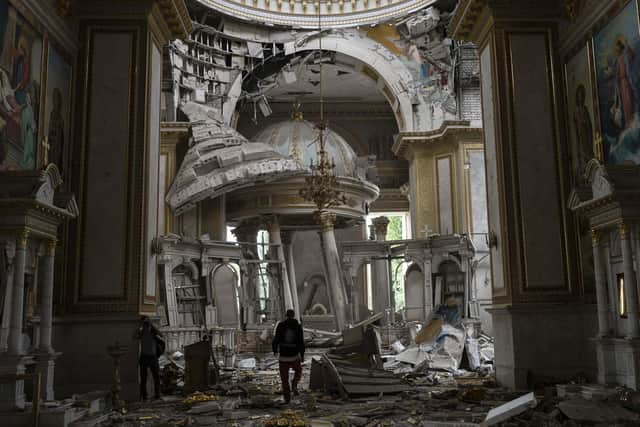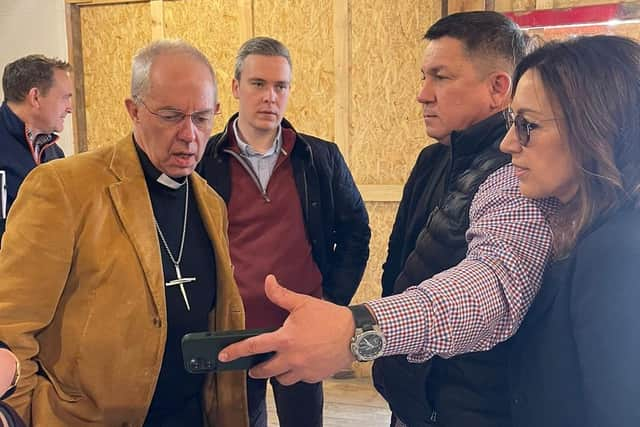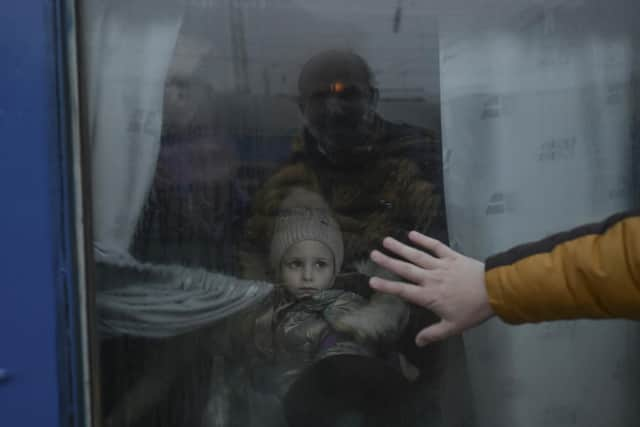Ukraine-Russia: Scottish aid worker tells stories of displaced Ukrainians in Odessa on visit with Archbishop of Canterbury Justin Welby
When charity worker David Green had to dash to a bomb shelter in the middle of an otherwise ordinary meal in the Ukrainian city of Odesa earlier his month, it brought home the reality of life in a country still blighted by war.
“The strange thing is it felt so normal,” said Christian Aid’s public engagement lead Mr Green, from Inverness. “We were having a lovely meal, then the air raid alarm started to go off and we spent most of the rest of the night in a bomb shelter. But for the people we were with, this was nothing, they were so used to it. It was quite remarkable.”
Advertisement
Hide AdAdvertisement
Hide AdHe added: “The fact this is normality for some people is just absolutely wrong.”


Mr Green was on a visit to Ukraine with the Archbishop of Canterbury, Justin Welby, to see first-hand the work carried out by charity partner Heritage Ukraine as the conflict enters its third year this weekend.
Heritage Ukraine is supported by Christian Aid through a partnership with Scotland-based Blythswood Care and with funds from the Scottish Government. Before the war, Heritage helped orphans and families in crisis. However, since the full-scale invasion in February 2022, they expanded to provide shelter, food, cash and legal support to the elderly, children and people with disabilities.
“The war is still going on – it is real and people get killed every day,” said Alyona Puzanova, from Heritage Ukraine.
“We can smile, we can give a hug but, in our circumstances, people need more than a hug. They need a home, they need medicine, they need so much more.”


“At first [at the outbreak of the war] it was definitely a huge shock. As a team, we all felt lost, and we found ourselves looking at each other and asking ‘what we do next?’ We didn't know if we could continue because of how dangerous it was. But within a week, and with more volunteers, we adjusted. We went to the train station with thousands of sandwiches for people fleeing the fighting.”
During the visit, the Archbishop spoke to 73-year-old Lyuba, who told him how her home was destroyed, and her daughter killed in a Russian attack just a month before arriving in Odesa.
Lyuba comes from a village in the Kherson region, a four-to-five-hour car drive away from Odesa. Her village, which was under Russian control earlier in the war, once had 3,000 inhabitants, but she believes all but 100 have fled. However, because so many people from her village are without mobile phones, she cannot stay in touch and worries about what has happened to her community.
Advertisement
Hide AdAdvertisement
Hide Ad“We did not plan to be evacuated, but our daughter was killed on 21 December when she was walking on the street,” she said.


“We buried our daughter on the 26 December, but then the Russians hit our home at new year. That is when we made the decision to evacuate. We left with nothing and now we feel homeless.”
Prior to evacuating, Lyuba and her family lived for a year without electricity. They endured shelling non-stop and the sight of Russian troops across the river. She now suffers from bronchitis because they were living in a basement. “I don’t know what will happen, but we miss home very much, and we want to go back,” Lyuba said.
Millions of Ukrainians are living in damaged homes or in buildings which will not provide sufficient protection from the harsh winter. An estimated 14.6 million Ukrainians need humanitarian assistance. The war has also sparked the largest refugee crisis in Europe since the Second World War.
Alla and her eight-year-old son, Kolya, are also from the Kherson region and evacuated by the military to Odesa in September last year. They used to live close to the Nova Kakhovka Dam before it was destroyed, flooding their home.
Kolya has finally started school this year, however, his older sisters and grandmother are still in an area occupied by Russian troops.
“The war will end one day, and we will have to go home but we will have no home to go to,” said Alla. “I have a mother and two older daughters who still live under occupation. I don't even know if they live.”
Comments
Want to join the conversation? Please or to comment on this article.